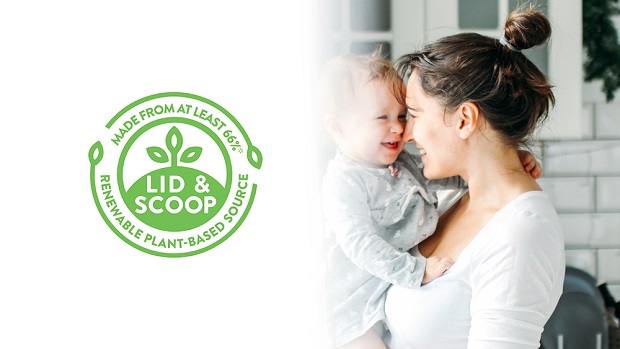Nestlé announced today that it will introduce bio-based lids and scoops made from sugar cane and its by-product for a range of its nutrition products for babies and children.
 The main advantage of these bio-based plastics is that they are made from a renewable plant material that can be continually replenished and that absorbs carbon dioxide from the atmosphere. In addition, this packaging helps Nestlé reduce its use of fossil-based plastics as part of its ambition to halve its emissions by 2030 and achieve net zero by 2050.
The main advantage of these bio-based plastics is that they are made from a renewable plant material that can be continually replenished and that absorbs carbon dioxide from the atmosphere. In addition, this packaging helps Nestlé reduce its use of fossil-based plastics as part of its ambition to halve its emissions by 2030 and achieve net zero by 2050.
In the UK and Ireland, SMA Nutrition and Nestlé Health Science are rolling out the new bio-based packaging materials for scoops and lids on tins.
“Nestlé continues to push the boundaries of science to provide nutritional solutions for children, and we are putting that same passion into pioneering new packaging that is good for our planet,” said Thierry Philardeau, Head of Nestlé Nutrition. “Families rely on us for support in the first 1,000 days of life—a critical time to shape a healthier and more prosperous future—and we are proud to be the first global brand to offer them solutions that maximize the use of renewable resources.”
Greg Behar, CEO of Nestlé Health Science, said, “It is our responsibility to our customers and to our planet to innovate on packaging materials that contribute to a more sustainable future. We are pleased that Nestlé Health Science’s pediatric range is our first product group to include the new bio-based lids and scoops: new solutions for a new generation.”
The lids and scoops are made from 66% and 95% sugar cane respectively. They are certified as plant-based plastic packaging and are widely recyclable. They are not compostable or biodegradable. They have the same properties and functionalities as conventional plastic ones, without compromising the high level of hygiene and freshness required. The bio-based lids and scoops complement the tin can which is metal-based and is the most recycled material in the world. This innovation is one of the many solutions Nestlé is working on to address the issue of packaging waste.
Ryan Carvalho, Head of R&D and Chief Medical Officer for Nestlé Nutrition said, “The development of innovative sustainable packaging solutions plays an important role in our journey to net-zero. Bio-based packaging from sugar cane is an excellent example of how we can make good use of plant-based raw materials that are renewable to develop better alternatives to traditional plastic while ensuring that our products maintain a high level of safety and quality.”
Nestlé is a founding member of the Bioplastics Feedstock Alliance that aims to encourage production of bioplastics feedstocks in an environmentally responsible, socially beneficial and economically viable manner.




Comments are closed.